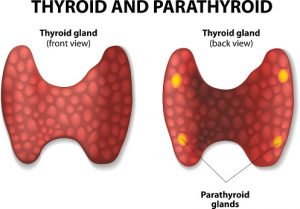
The thyroid consists of four parathyroid glands. In hyperparathyroidism, one or more of the glands develops a tumor, which makes the gland act erratically and overproduce parathyroid hormones.
Parathyroid hormones make their way to the bones and begin to remove the calcium, thus weakening the bones and contributing to osteoporosis.
Osteoporosis and hyperparathyroidism (parathyroid disease)
Osteoporosis is a bone disease that increases a person’s risk of fractures. Osteoporosis generally comes with aging and affects far more women than men. As bone loss occurs, the bones become thinner. And, as previously explained, parathyroid hormones can contribute to this bone loss, as they remove calcium from the bones.
When hyperparathyroidism plays a role in osteoporosis, the bones can start aching, as the parathyroid hormones work to slowly destroy them.
Calcium is an integral part of strong bones, and lack of calcium also plays a role in osteoporosis. The amount of calcium found in our bones is regulated by the parathyroid gland. In particular, it regulates how much calcium becomes absorbed from the diet, and the amount of calcium released by the kidneys. Our bones use most of calcium that we take in, but calcium is also used in other bodily functions.
In hyperparathyroidism, the release of excess parathyroid hormones allows for excess calcium to be secreted into the blood. Once it’s in the bloodstream, you begin to feel sick. Moreover, the excess calcium in the bloodstream can even contribute to kidney stones hailed as being incredibly painful.
Osteoporosis can be caused by excess parathyroid hormones, age, and lack of estrogen due to aging. Therefore, if you’re an older woman, you already have age and low estrogen factors against you. Combine that with hyperparathyroidism, and your risk of fractures rises exponentially.
Hyperparathyroidism (parathyroid disease) causes and symptoms
Hyperparathyroidism is a condition in which a tumor grows on one or more of the parathyroid glands. This causes the malfunctioning of the glands, prompting them to produce too much parathyroid hormones. The parathyroid gland is responsible for controlling calcium. When the calcium is in excess, it leaves the bones and enters the bloodstream.
Hyperparathyroidism may often go symptomless, but when symptoms do occur, you may experience some of the following:
- Depression
- Fatigue
- Excessive thirst and urination
- Feeling sick
- Loss of appetite
- Muscle weakness
- Constipation
- Stomach pains
- Loss of concentration
- Mild confusion
If hyperparathyroidism is left untreated, symptoms can worsen to the following:
- Vomiting
- Drowsiness
- Dehydration
- Confusion
- Muscle spasms
- Bone pain
- Irregular heartbeat
- High blood pressure
Symptoms are often unrelated to the severity of calcium loss. For example, someone may have high levels of calcium loss and never even experience any symptoms, and vice versa.
Hyperparathyroidism treatment and home remedies
Medications can work to treat hyperparathyroidism, too. Medications include calcimimetics (which mimic calcium in the body), hormone replacement therapy, and bisophosphonates, which prevent calcium loss in the bones.
Home remedies as well can go a long way in the treatment of hyperparathyroidism. Some home remedies to utilize include:
- Monitor calcium and vitamin D intake within your diet.
- Drink plenty of fluids to reduce the risk of kidney stones.
- Exercise regularly to keep bones strong.
- Stop smoking as it has been shown to weaken bones.
- Avoid calcium-raising drugs, as the body will already have too much to begin with.
Working closely with your doctor, you can create personalized treatment that is best for your condition, whether that be surgery or medications.